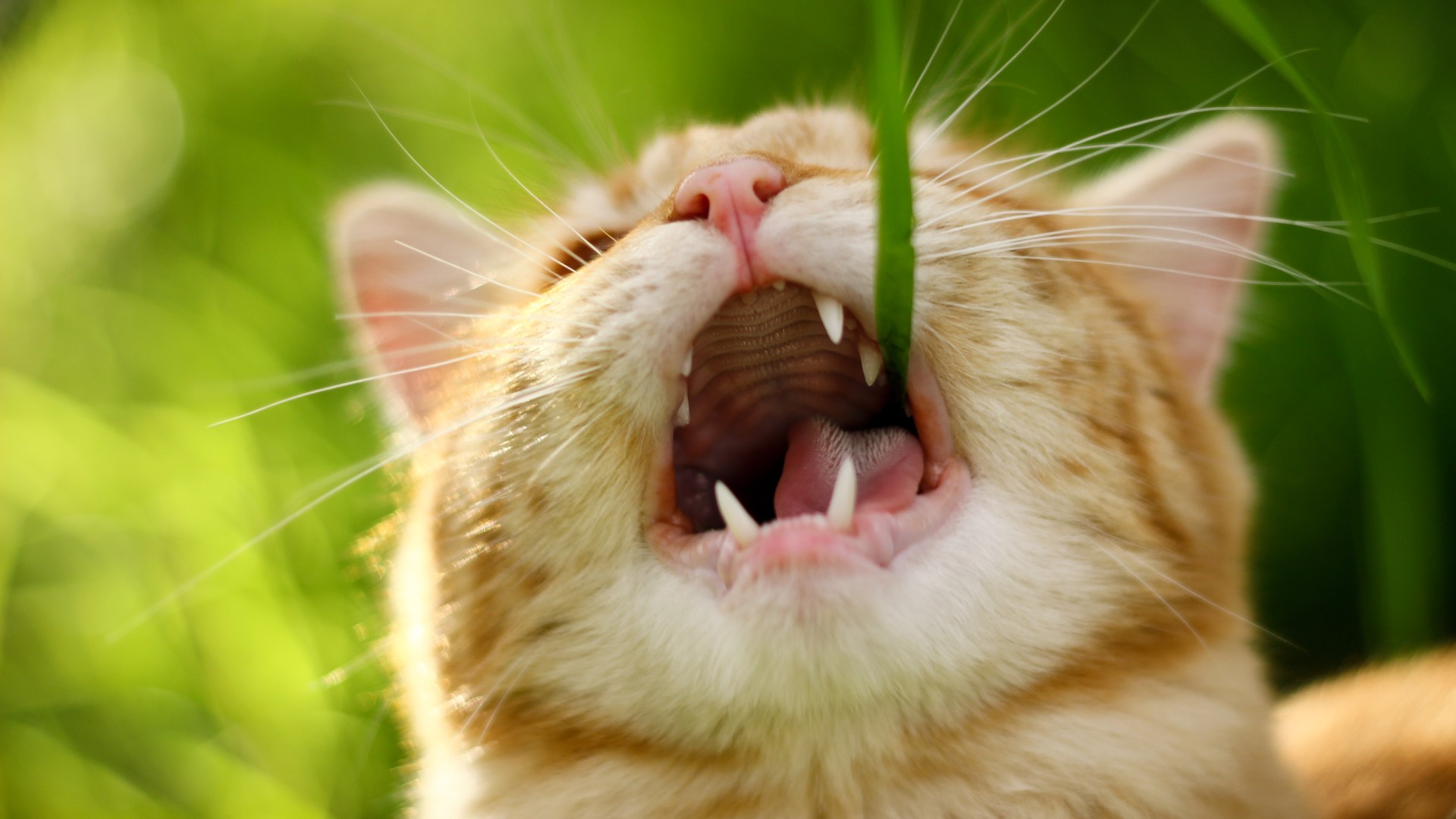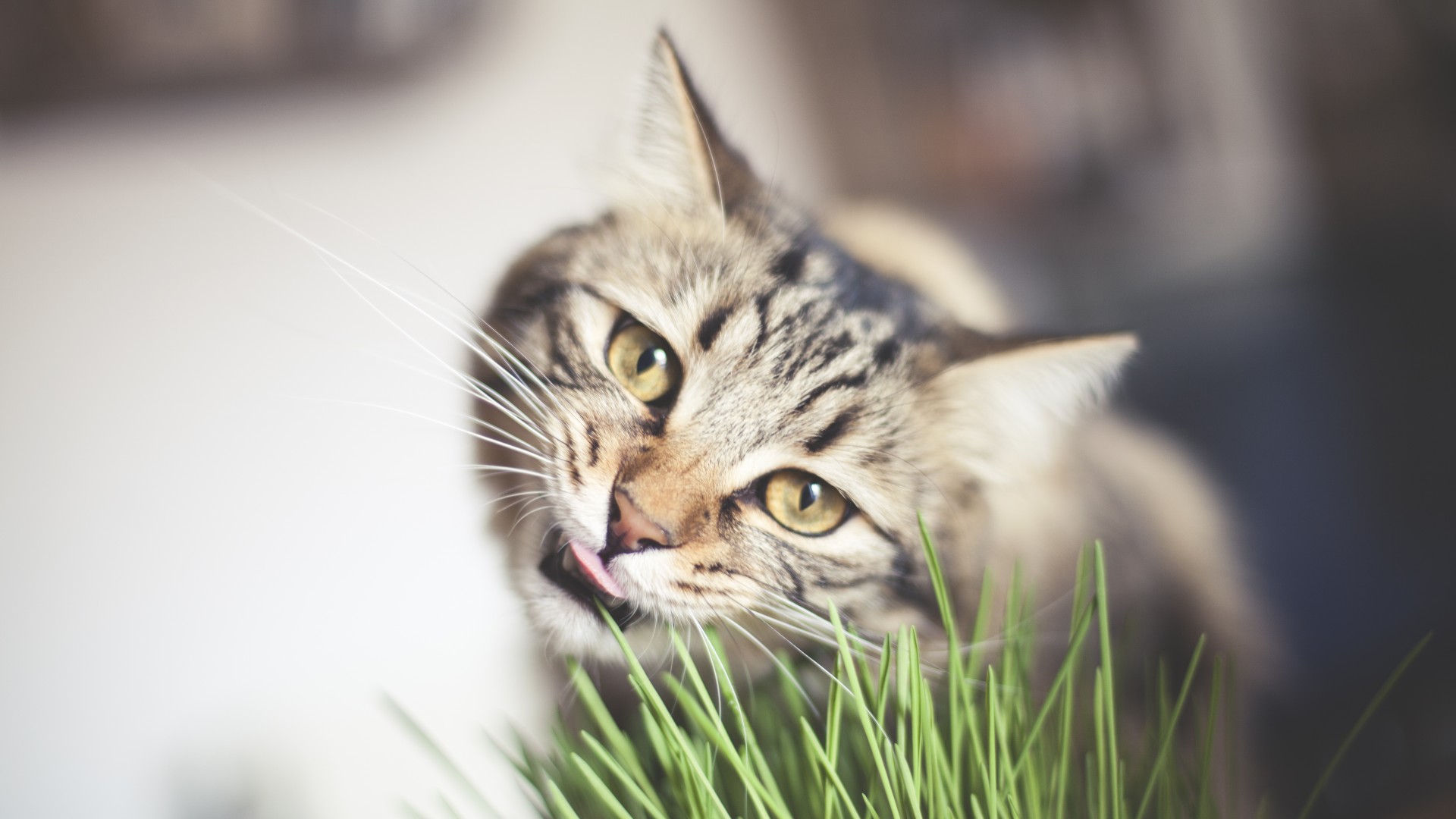Why does my cat eat grass?
If you’ve been pondering the question, 'why does my cat eat grass', we’ve got the answer, and it turns out they’re not crazy after all!

Ever found yourself googling, 'why does my cat eat grass?' Our feline friends partake in lots of weird and wacky behavior, one of which can leave pet parents scratching their heads and asking the above question.
If you’ve spent a fortune filling their food bowl with the best cat food and still find them munching on the green stuff the minute your back is turned, don’t be disheartened – grazing the backyard buffet from time to time is completely normal.
While it may look like your cat is confusing themselves with a sheep, almost all kitties consume grass, and are typically A-OK when doing it. So if your cat is purrfectly healthy, why are they choosing to turn your lawn into lunch? Let’s find out...
- Seven common cat behavior problems solved
- Cat communication explained: Five important things your feline is trying to tell to you
Nature’s laxative
Even your cat has times when their little machine is less well oiled and more backed up. As luck would have it, grass might just have a laxative effect.
Whether it's food that hasn’t been properly digested, or there’s a clog due to a huge furball, broad grass in particular is full of fiber that can help move things along, thus giving the question of 'why does my cat eat grass' a plausible answer.
Eating grass can help gently get the digestive system going again, relieving constipation, and helping your kitty to feel more comfortable.
Soothing unsettled stomachs
While broad grass is great for providing the roughage needed to move things along at the bottom end, narrow grasses can help your kitty to vomit up anything that’s causing them to be ill.
Pet parents often worry when they see their cat being sick after eating grass, and understandably assume that it’s the grass making them ill. It’s true that cats don’t have the necessary enzymes to digest grass, and this causes them to vomit, but they’ve usually nibbling on it for exactly that reason.
Sometimes cats will eat a bird or a mouse, and bits of feather or bone will become lodged in their stomach. Our feline furkids know that eating grass is likely to cause them to vomit, and that when they do, whatever is in their stomach will be forced out. Bet that wasn't the answer you were expecting to the question, 'why does my cat eat grass?'
As long as the grass hasn’t been treated with fertilizer or pesticides, there’s no need to be concerned if they vomit after eating it. While it’s not very pleasant to watch, it’s highly likely they’ll feel a whole lot better for it.
Emotional eating

If you had no idea that emotional eating affects cats as well as humans, you’re not alone. But, it turns out that comfort eating during times of change, stress, or anxiety is common in the feline world. So the question 'why does my cat eat grass' might not be such a trivial one after all.
While excessive grooming or vocalization are the more familiar signs of stress in cats, some take to chowing down on natures chewing gum – grass. Chomping on the green stuff can help calm a cats nerves.
If you notice that your kitty is obsessively chewing on grass, it’s worth taking them to the vet for a checkup. For those times when you know that your cat has a reason to feel stressed, such as following a move to a new house, investing in a stress-relieving device such as the RelaxoPet Pro or a diffuser or spray like the Feliway can be worth a try.
It’s in the juice
Still wondering, 'why does my cat eat grass?' Just as some humans like throwing back wheatgrass shots, some cats are prone to a bit of juicing themselves. It turns out that grass juice is high in folic acid, much like their mother's milk, and this vital vitamin helps increase oxygen levels in the blood.
If a cat isn’t quite getting what they need from their wet or dry cat food, they may turn to grass as a way of seeking out certain vitamins and minerals. Folic acid deficiency is rare in cats, but it’s worth speaking with your vet if you’re concerned about your furkid's diet.
Should I be concerned about my cat eating grass?
Has the question, 'why does my cat eat grass?' not been answered for you yet? For the most part, your cat eating grass is no cause for alarm. If it’s the occasional nibble or binge session that’s happening once a week or less, then it’s highly likely that your cat is ingesting it for one of the reasons listed above.
If, however, those grass-grazing periods become a regular or daily occurrence, it’s worth getting your cat checked out. Munching on grass every day can indicate a digestive issue that may warrant swapping out your furkids' regular food for specifically formulated cat food for allergies.
Keeping your kitty safe

While you can’t always control where your cat wanders off to, there are a few things you can do around your own home and yard to make sure that your kitty's green meals are safe for them to consume.
Make sure you don’t treat your lawn with any fertilizers or pesticides, as these can deadly to your cat if ingested. Keep your garden free of toxic plants, and if you notice your cat vomiting blood after nibbling on anything outdoors, take them to the vet straight away.
Consider planting plenty of kitty-friendly flora and fauna in your garden. If you’ve been wondering is catnip bad for cats, the answer is a big NO. Most cats can’t get enough of this plant, and it’s safe for them to nibble on, so it’s a win-win.
Finally, if you have an indoor cat that likes to nibble on the greenery, make sure you steer clear of toxic houseplants. These include popular choices such as lilies, amaryllis, and aloe plants.
Is your cat eating too fast? Here's why, according to a vet.
PetsRadar Newsletter
Get the best advice, tips and top tech for your beloved Pets

Kathryn is a freelance writer who has been a member of the PetsRadar family since it launched in 2020. Highly experienced in her field, she's driven by a desire to provide pet parents with accurate, timely, and informative content that enables them to provide their fur friends with everything they need to thrive. Kathryn works closely with vets and trainers to ensure all articles offer the most up-to-date information across a range of pet-related fields, from insights into health and behavior issues to tips on products and training. When she’s not busy crafting the perfect sentence for her features, buying guides and news pieces, she can be found hanging out with her family (which includes one super sassy cat), drinking copious amounts of Jasmine tea and reading all the books.
